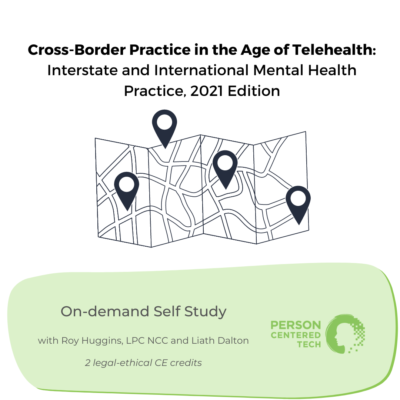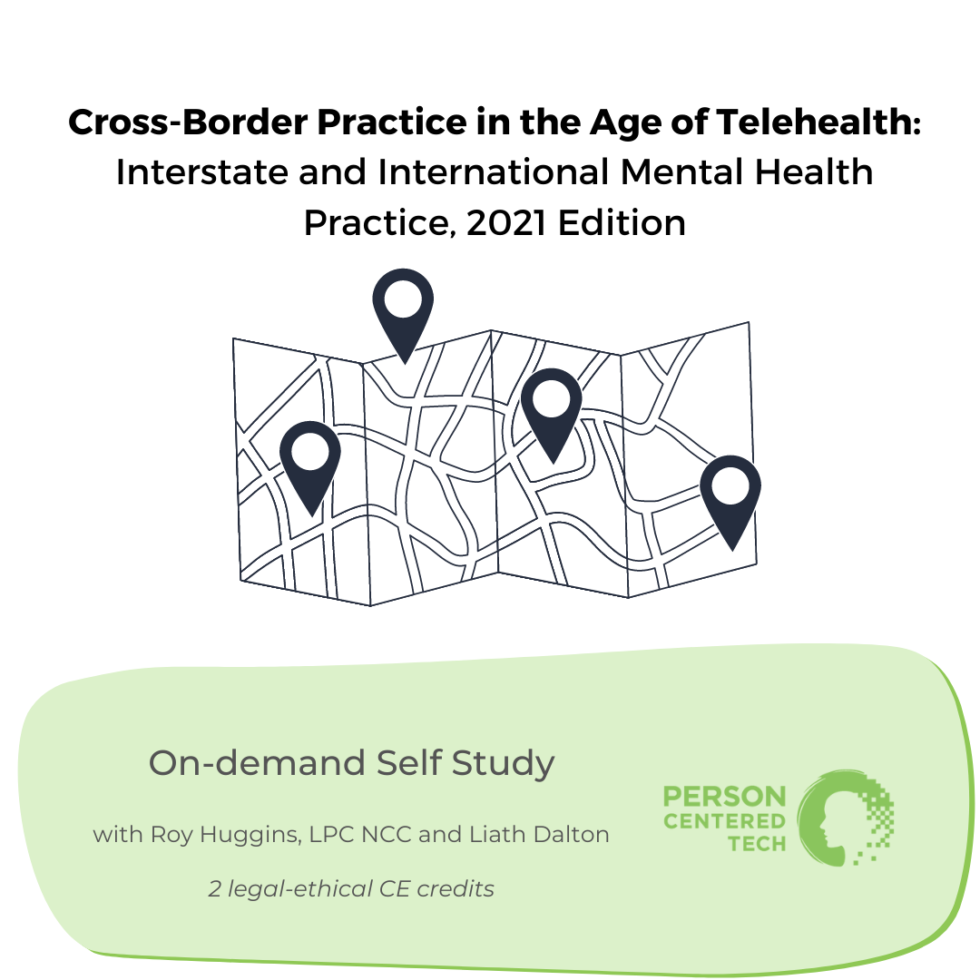Cross-Border Practice in the Age of Telehealth: Interstate and International Mental Health Practice, 2021 Edition
2 CE Credit Hours. Legal-Ethical. Continuing Education Session Replay
Presented By: Roy Huggins, LPC NCC and Liath Dalton
All new content reflecting the updated rules for 2021
This course keeps growing! Our 2020 version was just 90 minutes long, and this year, we’re updating and adding according to your feedback, we’ve got a full 2 hours of valueable information for you.
Some questions we will address in this year’s cross-border practice course:
- Which states or nations will allow me to work with clients within their borders?
- Will my own state allow me to work outside its borders?
- Can I travel out-of-state and work with clients back home?
- How do I find out if a state normally allows temporary practice from out-of-state?
- What is being done to remove barriers to cross-state practice in the US?
- How do PSYPACT, the Counseling Compact, and other such programs affect my ability to reach clients across borders?
- What risks do I need to manage when working across states?
- What risks do I need to manage when working with clients in nations that don’t regulate my professional practice?
Course Description

Educational Objectives
Educational Objectives:
- Describe why cross-border practice might be illegal and 2 legal risks that accompany unpermitted cross-border practice
- Describe 3 different schemes of temporary practice provision and how they impact the learner’s ability to work with clients who are present in foreign states.
- Describe 2 methods for discovering the circumstances of legal practice with clients present in nations outside the United States.
Syllabus
Syllabus:
- Why do we even have to worry about cross-border/interjurisdictional practice?
- The role of licensing boards in the US.
- When and how foreign licensing board rules come into play.
- Concrete risks in illegal cross-border/interjurisdictional practice.
- 3 Types of Cross-Border Practice
- Client is in a foreign jurisdiction
- Therapist is in a foreign jurisdiction
- Client and therapist are both in foreign jurisdictions
- Getting answers about practice in foreign jurisdictions
- The info items a therapist needs to know about practice in a foreign jurisdiction to determine if it is legal to work from there or with clients there
- A process for getting these answers from US states
- A process for getting these answers in nations outside the US
- Current and Future Efforts to Reduce Interstate Practice Barriers
- PSYPACT, the Counseling Compact, and more
- Legislative efforts to reduce barriers
- Working with clients in foreign nations
- The difference between practice being permitted and practice not being forbidden.
- Some risks and benefits of Roy’s telepractice in Japan.
- A demonstration of finding potential information sources in nations where government websites are not written in English, or where information about practice licensure/registration is not findable.
- Working with clients in US states where one is not licensed
- Some specific state boards without any temporary practice allowance of any kind, and how we discovered that fact.
- Some specific state boards with temporary practice allowance rules, and how we discovered that fact.
- Some specific state boards that restrict the ability of therapists to work with clients while the therapist travels out of state.
References
- Rev. Stat. §36-3606. (Arizona 2021.) https://casetext.com/statute/arizona-revised-statutes/title-36-public-health-and-safety/chapter-36-telehealth/article-1-general-provisions/section-36-3606-interstate-telehealth-services-registration-requirements-venue-exceptions
- H.B. 2454. (Arizona 2021.) https://www.azleg.gov/legtext/55leg/1r/bills/hb2454p.htm
- Executive Order 2021-13, State of Arizona. Rescinding Telemedicine Executive Orders Due to Passage of Permanent Legislation. (2021, May 5.) Retrieved July 22, 2021, from https://azgovernor.gov/sites/default/files/eo_2021-13.pdf
- WV Code §30-1-26. Telehealth practice. (West Virginia 2021.) https://code.wvlegislature.gov/30-1-26/
- H.B 2024. (West Virginia 2021, March 30.) http://www.wvlegislature.gov/Bill_Status/bills_text.cfm?billdoc=HB2024%20SUB%20ENR.htm&yr=2021&sesstype=RS&i=2024
- H.B. 5596, Public Act No. 21-9. An Act Concerning Telehealth. (Connecticut 2021.) https://www.cga.ct.gov/2021/ACT/PA/PDF/2021PA-00009-R00HB-05596-PA.PDF
- Executive Order No. 12B, State of Connecticut. Protection of Public Health and Safety During COVID-19 Pandemic – Extension and Expiration of COVID-19 Orders. (2021, May 5.) Retrieved July 22, 2021, from https://portal.ct.gov/-/media/Office-of-the-Governor/Executive-Orders/Lamont-Executive-Orders/Executive-Order-No-12B.pdf
- Executive Order 2020-1, State of Wyoming. Declaration of a State of Emergency and a Public Health Emergency. (2020, March 13.) Retrieved July 22, 2021, from https://drive.google.com/file/d/19mX3feCje2NKRrKi_GPiKvwcckGVoVBh/view
- Wyoming Administrative Code: Mental Health Professions Board: Mental Health Professions Licensing Board: Chapter 20 – Disaster Relief. Justia Law. (n.d.). Retrieved July 22, 2021, from https://regulations.justia.com/states/wyoming/mental-health-professions-board/mental-health-professions-licensing-board/chapter-20/
- Wyoming Administrative Code: Mental Health Professions Board: Wyoming Board of Psychology: Chapter 14 – Disaster Relief. Justia Law. (n.d.). Retrieved July 22, 2021, from https://drive.google.com/file/d/1YS8LV5Ckp-zMJTp9HyMGkqUb8-yVUI5p/view
- 2016 Colorado Revised Statutes :: Title 12 – :: Professions and Occupations :: Health Care :: Article 43 – :: Mental Health :: Part 2 – :: General Provisions :: § 12-43-215. Scope of article – exemptions. (n.d.). Retrieved July 31, 2020, from https://law.justia.com/codes/colorado/2016/title-12/health-care/article-43/part-2/section-12-43-215/
- Arizona Statute 32-2075. Exemptions from licensure. (n.d.). Retrieved July 31, 2020, from https://www.azleg.gov/viewdocument/?docName=http://www.azleg.gov/ars/32/02075.htm
- Florida Statute 456.47 Use of telehealth to provide services. (2019, July 1). Retrieved July 31, 2020, from http://www.leg.state.fl.us/statutes/index.cfm?App_mode=Display_Statute&URL=0400-0499/0456/Sections/0456.47.html
- Person Centered Tech, Inc. (2020). 50-State Emergency Teletherapy Practice Rules Survey for Counselors, MFTs, Psychologists, and Clinical Social Workers. Retrieved May 28, 2020, from https://dev-personcenteredtech.com/50-state-emergency-teletherapy-practice-rules-counselors-mfts-psychologists-social-workers/
- Person Centered Tech, Inc. (2021). Teletherapy Practice Rules by State for Counselors, MFTs, Psychologists, and Clinical Social Workers. Retrieved July 23, 2021, from https://dev-personcenteredtech.com/teletherapy-practice-rules-by-state/
- State of Florida Department of Health Emergency Order DOH 20-003. (2020, March 21). Retrieved July 31, 2020, from https://www.flgov.com/wp-content/uploads/covid19/DOH EO 20-003 3.21.2020.pdf
- SUMMARY OF BOARD ACTIONS – COVID-19 STATE OF EMERGENCY … (n.d.). Retrieved July 31, 2020, from https://psychboard.az.gov/sites/default/files/documents/files/COVID-19 Waivers.pdf
- US Dept. of Health and Human Services. (2006). HIPAA Administrative Simplification . Washington, DC: Author.
Presented/Developed By
 Roy Huggins, LPC NCC, is a counselor in private practice who also directs Person-Centered Tech. Roy worked as a professional Web developer for 7 years before changing paths and makes it his mission to grow clinicians’ understanding of the Internet and other electronic communications mediums for the future of our practices and our professions.
Roy Huggins, LPC NCC, is a counselor in private practice who also directs Person-Centered Tech. Roy worked as a professional Web developer for 7 years before changing paths and makes it his mission to grow clinicians’ understanding of the Internet and other electronic communications mediums for the future of our practices and our professions.
Roy is an adjunct instructor at the Portland State University Counseling program where he teaches Ethics and is a member of the Zur Institute advisory board. He has acted as a subject matter expert on HIPAA, security, and clinical use of technology for Counseling licensure boards, and both state and national mental health professional organizations. He has co-authored or authored 2 book chapters, and he routinely consults with mental health colleagues on ethical and practical issues surrounding tech in clinical practice. He served for 5 years on the board of the Oregon Mental Health Counselors Association and then the Oregon Counseling Association as the Technology Committee Chair.
He really likes this stuff.
 Liath Dalton is PCT’s deputy director and a co-owner. Liath is especially passionate about helping therapists be resourced and supported in navigating the security compliance process and identifying the solutions and processes that meet the particular needs of their practices. Liath’s consultation area of expertise is focused on selecting the right combination of services and tech that not only meet the legal-ethical needs of mental health practices, but also the functionality, efficiency, and cost-effectiveness needs as well.
Liath Dalton is PCT’s deputy director and a co-owner. Liath is especially passionate about helping therapists be resourced and supported in navigating the security compliance process and identifying the solutions and processes that meet the particular needs of their practices. Liath’s consultation area of expertise is focused on selecting the right combination of services and tech that not only meet the legal-ethical needs of mental health practices, but also the functionality, efficiency, and cost-effectiveness needs as well.
Program Notices
Accuracy, Utility, and Risks Statement: This program discusses strategies for complying with HIPAA, state rules in general, and covered ethics codes. It may not include information on all applicable state laws. Misapplication of the materials, or errors in the materials, could result in security problems, data breaches, or non-compliance with applicable laws or ethics codes.
Conflicts of Interest: None.
Commercial Support: None.
This course is subject to our cancellation/refund policy and complaint policy.

